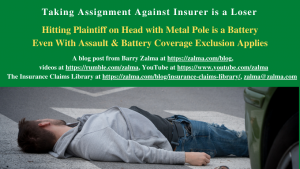Taking Assignment Against Insurance is a Loser

Hitting Plaintiff on Head with Metal Pole is a Battery
See the full video at https://rumble.com/v1mzfq8-taking-assignment-against-insurer-is-a-loser.html and at https://www.youtube.com/watch?v=iiqoxKxgt4g
Paul Semien (“Semien”), appealed the district court’s dismissal of his breach of contract claim for defense and indemnity against the Burlington Insurance Company (“Burlington”) after he was injured by a convenience store employee who hit him on the head with a metal pole. In Paul Semien v. The Burlington Insurance Company, No. 22-20195, United States Court of Appeals, Fifth Circuit (October 3, 2022) the Fifth Circuit applied the Eight Corners Rule and resolved the dispute in favor of the insurer.
Semien, a customer at a convenience store became embroiled in a dispute with the store’s clerk, Tam Truong, over Semien’s entitlement to store credits based on awards that he won from the store’s video poker machines. Truong left his post behind a glass-enclosed counter and hit Semien on the head with a metal pole, causing Semien severe injuries. Semien sued T&T and Truong in Texas state court (the “Underlying Lawsuit”) for negligence and assault against both Truong and his employer.
T&T had a general commercial liability insurance policy issued by Burlington (the “Policy.) “Coverage D” of the Policy provides for coverage up to $100,000 for assault and battery. But, Coverage D also excluded coverage when the assault or battery is “committed by any insured or agent of any insured.” The Policy defines “insured” to include T&T’s employees, but “only for acts within the scope of their employment by [T&T] or while performing duties related to the conduct of [T&T’s] business.”
Burlington denied that it had a duty to defend or indemnify T&T and Truong in the Underlying Lawsuit. Semien subsequently entered into a settlement agreement with T&T and Truong. As part of the settlement agreement, they assigned Semien “all rights they have jointly or separately to pursue claims and remedies under [their] insurance contract with The Burlington Company.”
Semien then sued Burlington. The district court granted the motion. Plaintiff timely appealed.
Under Texas law, an insurer’s duty to defend arises when a third party sues the insured on allegations that, if taken as true, potentially state a cause of action within the terms of the policy. But, if “the petition only alleges facts excluded by the policy, the insurer is not required to defend. Texas courts follow the eight-corners rule. Under this rule, courts determine whether an insurer has a duty to defend its insured by looking at the facts alleged within the four corners of the latest pleading upon which the insurer based its refusal to defend the action and the language within the four corners of the relevant insurance policy.
Since the Policy excludes coverage for assault or battery committed by an insured for acts within the scope of their employment and since Truong was working in the course and scope of his employment with T&T Global Enterprises Inc. when he hit Semien and Semien so alleged there was no coverage to defend or indemnify the insureds.
Reading the underlying pleading negates plaintiff’s contention that Truong was outside the scope of his employment at the time of the assault, and therefore was not an “insured” or “agent of an insured” under the Policy. This is true even reading the pleading liberally in favor of insurance coverage. Burlington had no duty to defend the insured in the Underlying Lawsuit.
Semien took an assignment of his claim against the people who injured him in favor of an attempt to get money from an insurer. If T&T or Truong had no assets then it was the only possible means of collecting damages. If, however, since T&T owned a convenience store it had some assets that Semien could have obtained with a judgment, the decision to let them off and sue the insurer who obviously owed nothing, was a waste of time and effort. The eight corners ruled eliminated coverage for T & T, Truong and Semien’s attempt to obtain damages.

(c) 2022 Barry Zalma & ClaimSchool, Inc.
Barry Zalma, Esq., CFE, now limits his practice to service as an insurance consultant specializing in insurance coverage, insurance claims handling, insurance bad faith and insurance fraud almost equally for insurers and policyholders. He practiced law in California for more than 44 years as an insurance coverage and claims handling lawyer and more than 54 years in the insurance business. He is available at http://www.zalma.com and zalma@zalma.com.Subscribe and receive videos limited to subscribers of Excellence in Claims Handling at locals.com https://zalmaoninsurance.locals.com/subscribe.Subscribe to Excellence in Claims Handling at https://barryzalma.substack.com/welcome.
Now available Barry Zalma’s newest book, The Tort of Bad Faith, available here. The new book is available as a Kindle book, a paperback or as a hard cover.
Write to Mr. Zalma at zalma@zalma.com; http://www.zalma.com; http://zalma.com/blog; daily articles are published at https://zalma.substack.com. Go to the podcast Zalma On Insurance at https://anchor.fm/barry-zalma; Follow Mr. Zalma on Twitter at https://twitter.com/bzalma; Go to Barry Zalma videos at Rumble.com at https://rumble.com/c/c-262921; Go to Barry Zalma on YouTube- https://www.youtube.com/channel/UCysiZklEtxZsSF9DfC0Expg; Go to the Insurance Claims Library – https://zalma.com/blog/insurance-claims-library
Like this:
Loading…
Related
About Barry Zalma
An insurance coverage and claims handling author, consultant and expert witness with more than 48 years of practical and court room experience.



